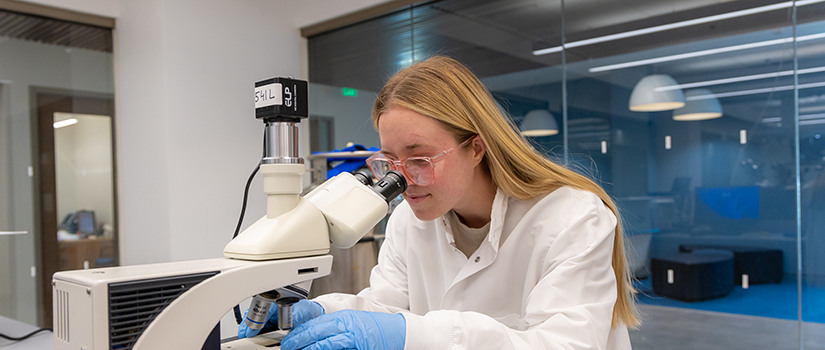At USC’s Awards Day, Katie McBride walked across the stage to receive the Outstanding Senior Award. It’s not the first time she’s been recognized at the university’s annual event.
Last year, McBride attended without knowing that she was there to receive a full-tuition scholarship for her senior year. She still chokes up when she talks about that day.
“I received the Hiram and Lawanda Allen Scholarship. Just hearing my name be called for that,” she says, too moved to continue for a moment. “That was kind of a goal that I had set for myself, and I'm so, so grateful.”
The honor also marked a distinction McBride might not have expected when she started in the College of Arts and Sciences: the award is given to one of the top students in the chemistry and biochemistry department.
“I hated chemistry. When I got into college, it was the hardest class I had ever taken. I didn't have chemistry in high school, and it was a very difficult transition for me,” McBride says.
Despite a rough start, McBride knew she needed to learn a lot of chemistry to succeed as a premedical student. So, she pushed through the next class and the next, eventually finding her footing and even becoming a biochemistry and molecular biology major.
“I entered the major kind of blind, hoping that it would prepare me for the MCAT,” she says. “At the time, I had no idea what the different kinds of chemistry were, but taking organic and physical chemistry altered my perspective on the field as a whole.”
McBride became a teaching assistant for general chemistry labs, where she helped other students overcome the challenges of learning chemistry for the first time. She also took on a volunteer position in Professor Natalia Shustova’s lab, where she pushed her chemistry and research skills to the next level.
Her approach led to success: when she took the Medical College Admission Test, she scored in the 96th percentile on the section that includes chemistry.
“It was a complete turnaround from my freshman year,” she says. “And I know without a shadow of a doubt that it wouldn’t have been possible without the additional support and experience working in Dr. Shustova’s lab.”
McBride was in good hands with Shustova, who has been recognized by USC and internationally for her research program. Working with a graduate student in the group, McBride studied how light can transform molecules. She was a co-author on multiple articles published on their findings.
After two semesters of volunteering, McBride earned grants to support her time doing research with Shustova. As a junior, she received the Magellan grant, one of the most prestigious awards an undergraduate can achieve. She also got a summer internship with Penn State College of Medicine, on Shustova’s recommendation, which helped her prepare for medical school admission.
Shustova says undergraduate researchers like McBride play a role in her own success because they make valuable contributions to the work, but she’s also committed to helping her students achieve their academic goals.
“Of the nearly 60 undergraduates I’ve had in my lab over the years, 40 have gone on to medical school so far, and 14 have become Magellan Scholars,” Shustova says.
McBride says working in the lab gave her a clear path to success in her academic work and future career. It helped her excel in chemistry and gave her additional support to make her medical school application stand out.

“The graduate students encouraged us to go to poster presentation days, like Discover USC, which looks great on medical school applications,” she says. “And they know what needs to be on the application in order for you to get into medical school.”
McBride will be attending the University of South Carolina School of Medicine in the fall, where she hopes to continue doing research that aligns with her goals as a physician.
“I enjoy research, but I realized I missed the aspect of caring for patients that you have in medicine. However, my experience showed me that you can do both,” she says.
